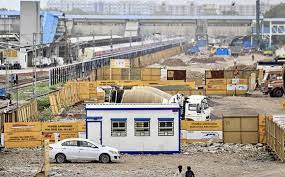New Delhi, Sept 25: The Department for Promotion of Industry and Internal Trade (DPIIT) will hold a series of workshops and deliberations in the coming months with all stakeholders on the recently launched National Logistics Policy, an official said.
On September 17, Prime Minister Narendra Modi unveiled the National Logistics Policy that seeks to address challenges facing the transport sector and bring down the logistics cost of businesses from 13-14 per cent to single digits in the coming years.
The policy has set targets and includes a detailed action plan to achieve them. The targets are — to reduce cost of logistics in India to be comparable to global benchmarks by 2030; improve the Logistics Performance Index ranking, to be among top 25 countries by 2030; and create data-driven decision support mechanism for an efficient logistics ecosystem.
“First we will organise a national workshop here on the policy in which there will be brainstorming sessions with all the key stakeholders, including Centre, states and the industry. The aim is to make stakeholders aware about its advantages,” the official said.
After that, the country will be divided into six zones for zonal conferences and then there will be workshops on different action plans of the policy, such as on warehousing, skill, and Ease of Logistics Services (ELoGS) platform.
The policy has laid down an action agenda for immediate on ground implementation of various initiatives.
To ensure that the benefits of this policy have maximum possible outreach, important initiatives under the policy including the Unified Logistics Interface Platform (ULIP), the Ease of Logistics Services platform, e-handbook on warehousing, training courses on PM GatiShakti and logistics on i-Got platform were launched along with the policy.
Companies can raise grievances on the ELoGS platform and that issue will be taken up by the concerned authorities on priority basis.
Citing an example, the official said there are about 200 Container Freight Stations (CFSs) in the country which deal with export and import related consignments.
But after the introduction of direct port delivery, these stations are unable to work to their full capacity. So they are urging the government to allow usage of these facilities for domestic purposes also, but the customs department has certain objections.
“So this issue will be discussed under the ELoGS platform,” the official added.
According to the DPIIT, this policy supports enhancing competitiveness of Micro, Small and Medium Enterprises, and other sectors such as agriculture and allied sectors, fast moving consumer goods and electronics. With greater predictability, transparency and reliability, wastages in the supply chain and need for huge inventory will reduce. (PTI)
Trending Now
E-Paper


